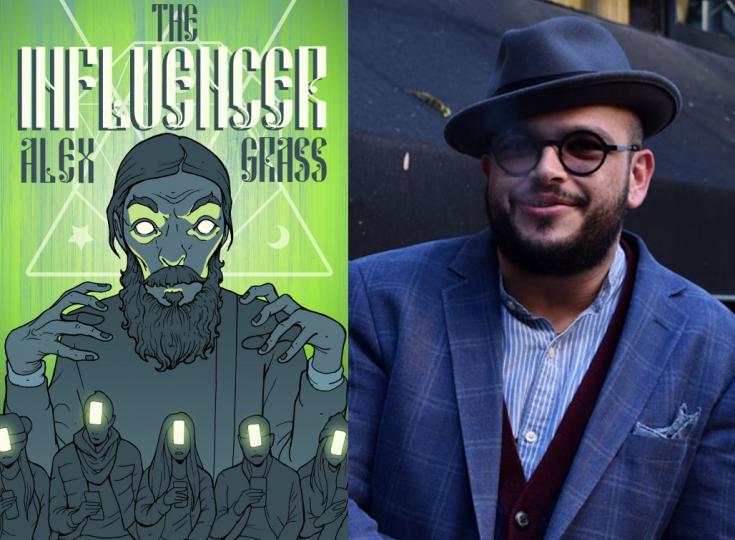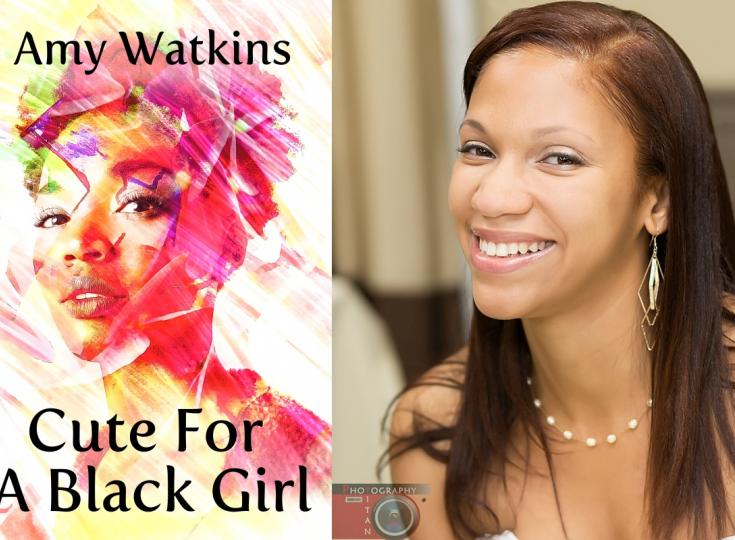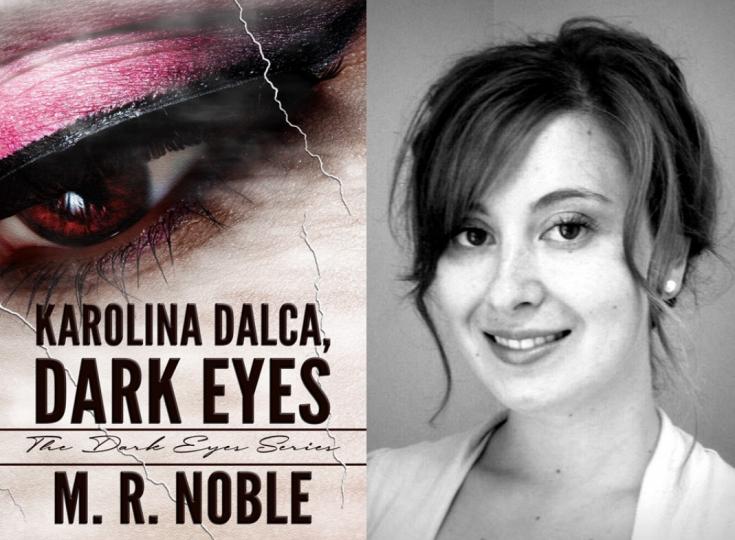Geoffrey Neil - Writing Heart-Thumping Thrillers
Geoffrey Neil, his wife and talkative son live in Los Angeles with a useless, ungrateful fish that Geoffrey threatens at least once daily. Completing a novel is a grueling process for Geoffrey, but he can't break his writing obsession even though he likes sleep, TV and people more than keyboards. His stories use disturbing implications more than graphic depictions to provide a satisfying thrill with little blood--a tactic many readers find equally assaulting on the senses. Geoffrey's overactive imagination and genuine fear of almost everything (You'd be shocked.) are tools that help him write thrillers, but also get him wound tighter than an eight-day clock. His wife calls him the mayor of Stress Town. This scares him. See? As our Author of the Day, Geoffrey tells us all about his latest heart-thumping thriller, Guile.
Please give us a short introduction to what Guile is about.
Guile features Ian Shaw, a miserable young man who feels that life can’t get any worse until his family piles on, arranging an intervention based on the flimsiest of evidence. They prod him to go to an expensive rehab facility touted to be loaded with comforts. They convince him it'll be like a vacation. En route, he quickly realizes that everything he’s been told untrue. The plot details his efforts to escape a hellhole of captivity. His circumstances change and he finds himself in a place of unimaginable luxury and complete freedom. The contrast is jarring until he discovers that his new opulent location will demand a price worse than the hell he’s already endured. His only chance to escape it all will require as much brainpower as physical strength.
What inspired you to write about someone who is sent to a posh resort for a luxurious recovery?
I wanted to use the extreme blindside of landing in misery after expecting luxury to create the same sort of shock and disappointment people would experience if they thought they’d booked a five-star hotel, only to pull their car into a dilapidated motor lodge. Except, in Ian’s case, the contrast between his expectation and reality is more horrifying as it’s life-threatening. Using clever, irresistible lures on unsuspecting victims has become a theme in most of my books. I knew that the time commitment and emotional motivation required for Ian to enter a rehab facility would need a strong enticement. I used a combination of nudging from his loved ones and the promise of luxury to lure him into making the tragic decision to undergo rehab.
Tell us more about Ian Shaw. What makes him tick?
Ian is a young man with strong potential for a good life but has no idea how to achieve it. The story finds him after he's suffered numerous personal setbacks, including bankruptcy, a breakup, and social isolation. He’s aware that all the good things in his life are disintegrating fast. He knows that he’s on the road to complete self-destruction and that he’ll need to make a huge change to turn things around. The only thing keeping him from suicide is his love for Kate. Throughout the story, Ian's will to survive is consistently underpinned by his desire to see Kate again and, hopefully, win her back.
Your stories are disturbing without being bloody. Why do you take this approach?
I’ve learned that scary implications leverage a reader’s imagination, enhancing their scare more than I could ever hope to with typed words. Simply alluding to danger always evokes readers to tap their imagination for whatever specifics terrify them most and includes their own unique set of imagery. It’s similar to when a fortune teller says, “I’m sensing that you aren’t happy with your life.” With that simple, vague statement, all that’s wrong with a person’s life comes rushing to mind. When the fortune teller says, “I see that something wonderful is about to happen to you,” it can instantly conjure a specific dream with fantastic detail. Employing this tactic can feel like a cheat for an author, but it inevitably works. And when you succeed in prodding a reader to ornament your words with their own fears, they’ll remember only how much you scared them when, actually, they did the heavy lifting to scare themselves.
When starting on a new book, what is the first thing you do?
Because writing a full-length novel is an enormous undertaking for me, my first step is always to select the topic that will evoke enough emotion from me to fuel finishing it. If my plot doesn’t emotionally affect me enough, I won’t be drawn to the keyboard strongly enough to complete it. For Dire Means, my angst about homelessness fueled me. For HR, it was the therapeutic catharsis of writing out a childhood nightmare. For Wanton Regard, it was the trauma I experienced as a stalker victim. Many of Guile’s story elements are metaphoric for my own escape from the zealotry that has many of my friends and loved ones trapped in the legalism, judgment, and the pathology of cultish ideologies. Guile touches on their incessant need to convince people to adopt their perspective—historically by any means necessary. Some of the portrayals in Guile will at first seem far-fetched but are actually common in practice. Less than a handful of friends will know how therapeutic it was for me to write Shaw’s experience with the Sadens and its ending.
Tell us more about the cover for Guile, and how it came about.
For me, designing a cover has always come immediately after deciding the story’s premise—even before I begin writing. When I designed the cover for Guile, I knew only that the book would explore deceit and trickery. I wanted a simple cover that would instantly convey that. I also wanted the cover’s message to be recognizable both as a thumbnail and full-sized. One of the most interesting and prominent characters in the story is a woman named Amity who always dresses in purple. So, the image of a woman concealing crossed fingers behind her back fit my conception.
Why is not knowing who you can trust so scary?
I think we always prefer to decide who we make ourselves vulnerable to, but sometimes circumstances decide who we must rely on. When dependency forces us to trust someone, we can only hope that person won’t hurt us. Anyone who’s been conned knows the pain of having trusted the wrong person. When it comes to trusting family and close friends, the emotional stakes of betrayal are far higher. I think all of us are afraid of discovering something that ruins our trust in the people we care about. I tried to tap this fear in Guile. Not only does Ian Shaw find that he’s completely vulnerable to everyone around him, but they’ve masterfully nourished his trust, completely distracting him so thoroughly that the possibility of betrayal was obscured until it was too late. Few things are scarier than that.
Did you plan out all the twists in the book, or did they just “happen” along the way?
I’m a “pantster” and have only recently started outlining my stories in advance. Scrivener is my preferred writing app. For Guile, I first created character profiles based on the general trajectory for the story I had in mind. Then I began writing chapter 1 by plopping the protagonist into as dramatic a situation as I could conjure and the rest of the story sprouted and began weaving from there.
What is your favorite line from the book and why?
In Guile, it was the last part of the opening paragraph where Ian is contemplating suicide: “…His loved ones would forgive him. As awful as it sounds, they’d secretly be grateful.” The reason this line resonated with me is because this is the first book in which I’ve tied the opening line of the story directly to the last line of the story. That took some effort, and I hope the tie-in will make readers smile. Another characteristic of my openings is that the first word of all my books is “If.” I decided to make that intentional because, for me, “if” is the ultimate fiction writer’s word. This tiny word launches all the possibilities of anything imaginable.
Do you have any interesting writing habits? What is an average writing day like for you?
I’m following a path toward becoming a full-time author. Meanwhile, I balance my day job as an IT consultant with my writing. I usually write best in total silence, doing 1-hour sessions. I try to use the Pomodoro method as often as possible with a tool on the website: https://e.ggtimer.com/pomodoro It helps me crank out a good word count more efficiently by giving me a time limit. Anything over a thousand typed words per day (or two thousand words if voice transcribed) is a productive day for me.
What are you working on right now?
I’m between stories, but do have a few ideas for the next book. At the time of this interview, Guile has been out for less than a month, so I typically wait a while for one of my ideas to take a stronger hold. It’s then that I spend a lot of time staring off into space or reading other books. It usually doesn’t take long for something to clobber me with inspiration.
Where can our readers discover more of your work or interact with you?
I’m always glad to hear from readers. I’m easy to reach via email at [email protected] or via my website: https://geoffreyneil.com Thank you for the interview!







